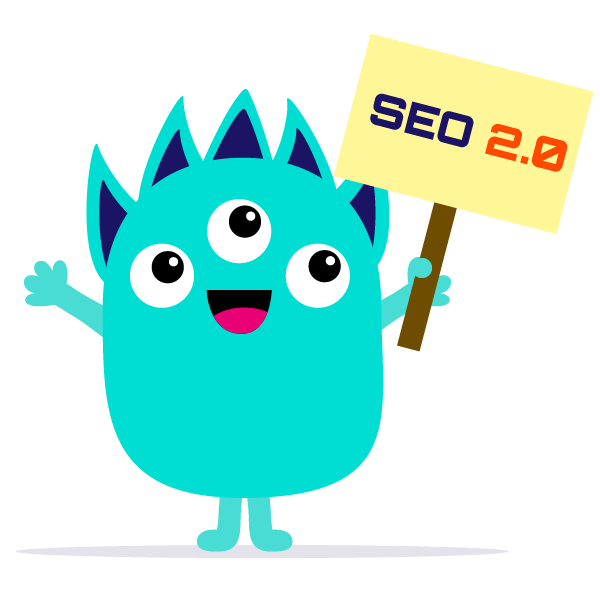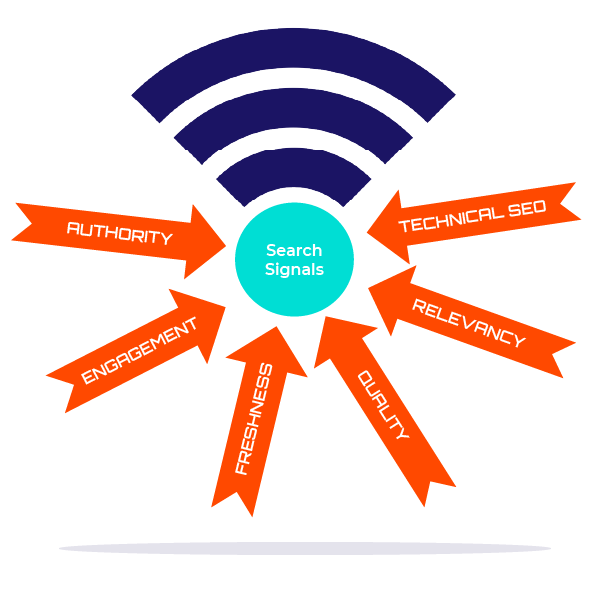SEO 2.0: Search Everywhere Optimisation including SEO for AI
Contents
SEO is for all search not just for Google
Search Engine Optimisation (SEO) is the traditional approach to ranking your content in search engines. However, let’s be honest, when we refer to SEO, we often mean SEO for Google. Google dominates the search landscape with over 90% of the search market.
As digital marketing evolves, audiences no longer solely rely on Google. Technology has advanced to a point where users can now turn to other search platforms like Bing, as well as AI (SEO for AI) and even social media (SEO for Social) channels such as TikTok.

New SEO: SEO 2.0
This shift brings us to SEO 2.0, or “Search Everywhere Optimisation”.
This is a term which offers a more comprehensive approach to search optimisation. It extends beyond traditional search engine optimisation.
But what exactly does this entail? And, what do we need to do to ensure content optimisation is maximised across all search-enabled platforms?
A search-enabled platform is any digital platform where users can search for information. Such as, Generative Engines or AI Search.
What is traditional Search Engine Optimisation?
Search Engine Optimisation (SEO) is the process of improving a website, and its content, to enhance visibility on search engines like Google – specifically focusing on organic search listings (not paid or sponsored listings). The main purpose of SEO is to increase content discoverability, making it easier for audiences to find relevant information.
To achieve this, SEO involves using relevant keywords—specific terms users are likely to search for. It also includes optimising for various signals, such as website structure, page performance, and quality of your content. This helps search engines understand and rank your content effectively.
Businesses have been using these strategies to help attract visitors and improve their online presence.
Understanding Types of signals

Search engines and AI platforms use varying signals to identify user intent, content relevance and context. This enables them to deliver more accurate and relevant results to the users.
Authority – Authority includes signals such as website authority and trustworthiness, quality and quantity of backlinks and how long your brand, product or service has been established.
Engagement – Engagement covers social media mentions, brand mentions, website page dwell time and reviews.
Freshness – simply put, is your content up to date?
Quality – This is about the quality of your content. Is your content unique, helpful and original? Do you cover a range of multimedia such as images, video and infographics?
Relevancy – This is about the meaning and context of your content. Does it match the intent of the user search enquiry? Does it answer the query with the relevant information?
Technical SEO – Technical SEO covers things like your slug, page performance, mobile friendliness, user experience and page structure.
Understanding search bots
Search bots, also called crawlers or spiders, are used to index content in search engines. They are automated programmes that systematically crawl (or navigate) the internet, visit web pages and gather data.
Search bots gather data that generates signals. For example, when a bot indexes a page, it evaluates factors like keyword density and page load speed, which become part of the signals used in ranking that page.
What does that mean for my content?
Even content written by the best copywriter can get lost. Especially, if you are not optimising the content you are crafting. How will users find it? Only by ranking in search results!
In parallel, content only optimised to rank in search results will receive limited engagement because it lacks the authenticity and connection that users need. If the content is purely designed for search algorithms, it will present as robotic or irrelevant to the audience’s needs.
How does Search Engine Optimisation differ from Search Everywhere optimisation?
Let’s take this back to basics. First, you need to understand your audience’s behaviour!
Understanding the different types of search queries
Generally, users looking to search engines for answers will use one of the 5 key query types. Once you understand the user’s type of search query, you can then create content that aligns with your user’s intent and they might search for it.
- Commercial intent queries are the ‘who and what‘ based questions. Such as users researching products or services before making a purchase decision. i.e. Compare car insurance
- Informational intent queries represent the ‘how to, what is and why‘ queries. This is when users are looking for information or answers to specific questions. i.e. What is SEO?
- Navigational queries are the ‘where‘ based questions. Usually when users want to find a specific website or page. i.e. Facebook login
- Transactional queries are when users are ready to purchase or complete a specific action. i.e. buy trainers
- Constructive prompts (AI only) users requesting AI to create or compile a result based on inputted information. (The result could be something other than text e.g. an image)
From here, you can determine the best platform for your content, (which is crafted based on user intent), to maximise its visibility in the results.
What types of content results does each platform offer users?
Each platform presents search or prompt responses differently, let’s go through these briefly:
- Google: pages of results, titles and descriptions and contextual related to queries (AI answer, images, maps, videos, news as appropriate)
- Bing: pages of results, titles and descriptions and contextual related to queries (facts, images, maps, videos, news, sources as appropriate)
- AI (generalised*):
Which platform answers which query the best?
In our extensive experience, we identified the best platforms depending on the users’ search query.
Commercial queries: Google generates the most comprehensive list of results.
Informational queries: Copilot and Gemini generate a fast and thorough answer to the question with further sources.
Navigational queries: Google and Bing generate a comprehensive list of direct links to websites and locational maps.
Transactional queries: Google offers a variety of purchase links and images at the top of search results!
Constructive prompt: Copilot generated great images!
What factors are important to be ranked across all platforms?
As with traditional SEO, the key signals are technical SEO and structured data. This is no change to the traditional SEO. Without the technical elements and structured data, search bots cannot scan your content to include it in the users’ search results.
What factors are important across the various platforms?
Here we offer some insights on which factors are considered across the platforms we have been focusing on.
| Technical SEO | All |
| Structured Data | All |
| Authority | Google, Bing, Copilot & ChatGBT |
| Content Quality | Google, Bing, Copilot & Gemini |
| Meaning | Google, Bing, Copilot & Gemini |
| Context | Google, Bing, Copilot & Gemini |
| Relevant Content | Google, Bing, Copilot & ChatGBT |
| Freshness | Bing, Copilot & Gemini |
| User Experience | Google, Bing & Copilot |
What does this mean?
It is clear that Technical SEO and Structured Data* are signals which all search takes into account. Therefore these need to be a priority in your approach to SEO.
For all content ensure that the technical aspects and your page structure are accurate and error-free. And the meta data populated too with care and attention – this is often what search platforms use when displaying your content.
Once you have identified which platforms will gain the most engagement for your content, you then refine your optimisation to ensure you optimise against the applicable factors.
* Structured data is code on your webpage (such as meta data) which help inform search platforms what the page is about. Platforms can pull this information an display as ‘snippets’ inside search results.
Will Google and other search engines become obsolete?
While Google remains the most widely used search platform globally, the search landscape continuously evolves. Future preferences for platforms may be shaped by the quality of responses users receive for different types of queries.
For instance, if Google consistently delivers the best answers to specific questions, users will continue to rely on it for those queries. Google has anticipated this shift by integrating AI-generated responses alongside traditional search results, ensuring that users have compelling reasons to stick with their platform.
As technology advances and user expectations change, the competition among search engines may intensify. That also includes the evolution of social media platforms and how users are leveraging user-based content to do their research.
Summary
SEO is for search, not just for Google. Search-enabled platforms are not just search engines any more, although Google continues to dominate.
So, do you need to change your approach to SEO 2.0?
No, not really! But, also yes….
What we will say is that you shouldn’t consider SEO to be search engine optimisation any more, but search everywhere optimisation. To do this, you need to consider the audience’s intent and behaviour. Once you understand this, you can craft the content accordingly. Want to know more about getting found online?
That said, SEO 2.0 is more strategic in nature, especially if you want to compete online with your competitors. We suggest you;
- Ensure your technical and structure elements are error-free and optimised across your entire website.
- Do your keyword research to understand your user intent – This step is significant as with the wrong data, you could craft content that just isn’t relevant.
- Craft content based on your research – What is your audience query? What kind of query is it?
- Identify which platforms will garner the best results for your content, in terms of where your audiences will be searching for said query.
- Once you have this information you can ensure you are optimising your content in a way that is favoured by said platform.
If you consider these elements then you will be ahead of the curve when it comes to SEO in the ever-changing world of digital.
Find out why your tech business needs SEO in 2025
Let us help with your SEO
Many consider SEO a marketing skill because it combines elements of digital marketing, content creation, data analysis, and technical knowledge, making it a multifaceted discipline.
Professionals in this field need to understand user behaviour, keyword research, and the algorithms that search engines use, as well as how to create engaging content that meets the needs of both users and search engines.
Would you like to receive a personalised website audit report?